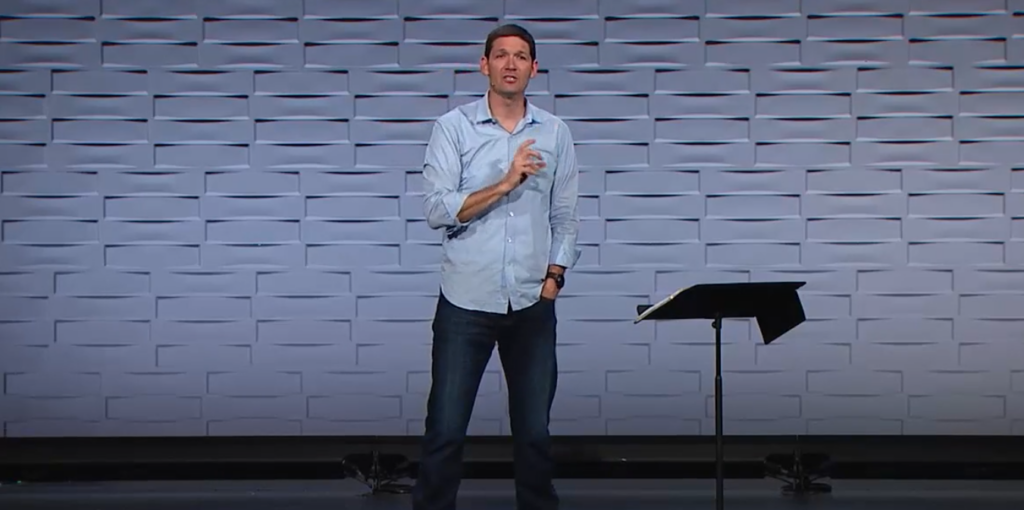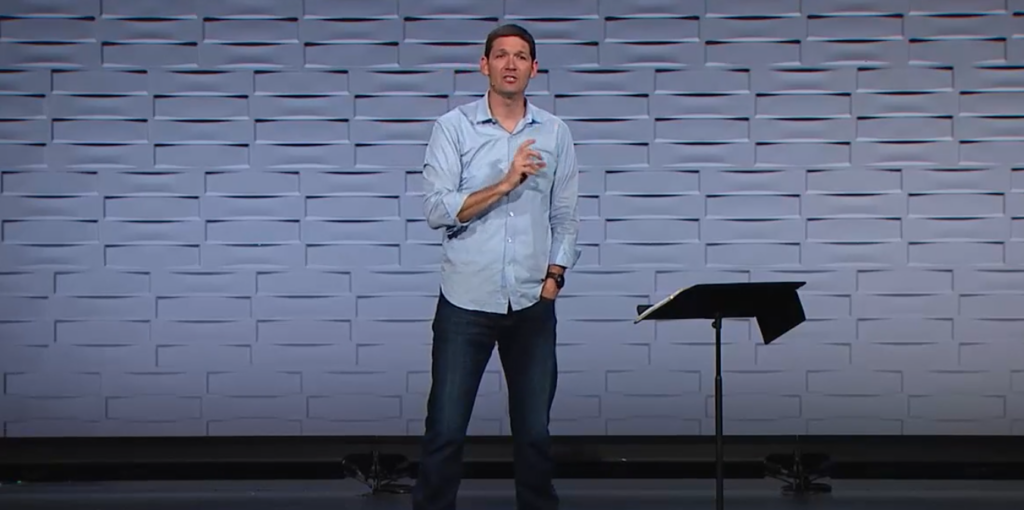
Okay, Christians. We need to have a talk about Matt Chandler.
We like Matt. Who couldn’t like Matt? He’s a great preacher. He’s entertaining as can be. He handled a nearly-terminal brain tumor like a God-glorifying champ. He gets the Gospel. So there’s that. We should applaud him for all those things. But that’s not what we need to talk about.
Let’s all admit that being really, really right on some things doesn’t make being really, really wrong on some other things okay. Neither does saying somebody is wrong about some things imply that we think they’re wrong on everything. So, we’re going to ask the legions of New Calvinist fanboys to set down their venti split-quad no foam lattes, put down their mole skin journals, and listen. Hear us out on this.
Matt Chandler – as swell of a guy as he is – has some deep theological problems. Chandler took over the troubled, Driscoll-stained Acts 29 Network at a difficult time of self-induced celebrity implosion. And, Chandler was one who – reluctantly and a day late and dollar short – finally gave Driscoll the boot. But, the charismatic commitment that forms the heart of the Acts 29 Network (it has always been charismatic, and includes on its board other charismatics, like Sam Storms) is a different kind of cancer that seems to have been slowly eating away at the doctrinal soul of Matt Chandler.
Endorsing Ann Voskamp – who writes theoerotic literature about making love to God – is not cool. It’s awful. It’s gross, for lack of a better word. Praying Jesus Culture “over” your church (the music group of what might be the most dangerous church in the country, Bethel Church in Redding, California) is nauseatingly off-putting for a serious-minded pastor. Repeatedly endorsing wild-eyed prophetess (who has the spiritual gift of speaking ecstatic utterance while still speaking English), Beth Moore, is – again – a monumental lack of discernment. Teaching the charismatic style of “binding and loosing” spirits is a bizarre departure from orthodoxy. Endorsing Lent isn’t exactly a historic practice for Protestants, let alone Reformed Protestants, let alone Particular Baptists (it has been gaining momentum the further we depart from the Reformation, however). Village Church pastors engaging in non-evangelical Interfaith Dialogues (dialogues where evangelism is not allowed) with Muslims isn’t good. Writing the foreword to Third Wave charismatic, Sam Storm’s book, “Practicing the Power,” is an atrocious departure from Reformed Theology. Chandler’s embrace of Islamic radical extremist groups in the name of a well-intentioned evangelical kumbaya was insanely wrong.
Aside from adopting the social justice, functional post-millennial culture-conquering common to New Calvinism (for an explanation of New Calvinism, click here), most of these errors are entirely due to one thing – Chandler’s insistence that the Apostolic Sign Gifts (which were only seen in Scripture as practiced by Apostles or by those upon whom the Apostles laid their hands) are for Christians today. In other words, it is Chandler’s charismaticism that is making him so wonky. But, doesn’t charismaticism always make people wonky?
Chandler has taken heat in recent weeks for being so vocal about his belief in the continuance of prophecy (which is the same thing as denying the sufficiency of Scripture – a very important Biblical doctrine). On November 12 in a sermon, Chandler said…
“My whole life in Christ, I have felt like a theological orphan…To be Reformed and charismatic — that’s a theological muck. I have felt like the child of divorced parents who badmouth one another every time I’m at their house for the weekend.”
Of course, Matt Chandler is not Reformed. It is impossible to be Reformed and a Charismatic. Reformed confessions – like the Westminster Confession of Faith and the Second London Baptist Confession, all explicitly deny the continuance of prophecy. Consider the Reformed Baptist Confession…
The Holy Scripture is the only sufficient, certain, and infallible rule of all saving knowledge, faith, and obedience, although the light of nature, and the works of creation and providence do so far manifest the goodness, wisdom, and power of God, as to leave men inexcusable; yet they are not sufficient to give that knowledge of God and his will which is necessary unto salvation. Therefore it pleased the Lord at sundry times and in divers manners to reveal himself, and to declare that his will unto his church; and afterward for the better preserving and propagating of the truth, and for the more sure establishment and comfort of the church against the corruption of the flesh, and the malice of Satan, and of the world, to commit the same wholly unto writing; which maketh the Holy Scriptures to be most necessary, those former ways of God’s revealing his will unto his people being now ceased.
That’s the first paragraph of the first chapter of the LBC1689. All Reformed believers deny the continuation of prophecy, because all uphold Sola Scriptura (a term invented to combat charismaticism, not Roman Catholicism). There’s simply no such thing as “Reformed and Charismatic.” What Chandler probably means is, “Calvinist and Charismatic,” but being Reformed and being a Calvinist are not synonymous (all Reformed believers are Calvinists, but not all Calvinists are Reformed). However, even holding to both Calvinism and Charismaticism is counterintuitive and contradictory.
I recognize that when people call themselves “Calvinist” they refer primarily to the five-pointed soteriology of John Calvin, and not necessarily to his theocratic advocacy for killing heretics, his paedobaptism, his sense of humor or even his eschatology. Nonetheless, if someone is going to call themselves a Charismatic Calvinist, it might be a good opportunity to see what John Calvin thought about the cessation of the Apostolic Sign Gifts.
Hence the office of the Spirit promised to us, is not to form new and unheard-of revelations…but to seal on our minds the very doctrine which the gospel recommends.1
The Spirit, Calvin claimed, was not promised to give us new revelations, but to seal our minds on the very doctrines explained and examined in the Sacred Writ. When you read Calvin’s comments in that section of the Institutes, you can only imagine what his derision would be for the modern Charismatic movement.
Those who, rejecting Scripture, imagine that they have some peculiar way of penetrating to God, are to be deemed not so much under the influence of error as madness. For certain giddy men have lately appeared, who, while they make a great display of the superiority of the Spirit, reject all reading of the Scriptures themselves, and deride the simplicity of those who only delight in what they call the dead and deadly letter. But I wish they would tell me what spirit it is whose inspiration raises them to such a sublime height that they dare despise the doctrine of Scripture as mean and childish. 2
Calvin was particularly incensed at the notion of continued Apostolic-level signs and wonders. He was repulsed at the notion that continued signs and wonders or direct revelations was to be expected or even accepted, as the Catholic Church taught with their claims of mystic power.
In demanding miracles from us, they act dishonestly; for we have not coined some new gospel, but retain the very one the truth of which is confirmed by all the miracles which Christ and the apostles ever wrought. But they have a peculiarity which we have not—they can confirm their faith by constant miracles down to the present day! Way rather, they allege miracles which might produce wavering in minds otherwise well disposed; they are so frivolous and ridiculous, so vain and false. But were they even exceedingly wonderful, they could have no effect against the truth of God, whose name ought to be hallowed always, and everywhere, whether by miracles, or by the natural course of events. The deception would perhaps be more specious if Scripture did not admonish us of the legitimate end and use of miracles. Mark tells us (Mark 16:20) that the signs which followed the preaching of the apostles were wrought in confirmation of it; so Luke also relates that the Lord “gave testimony to the word of his grace, and granted signs and wonders to be done” by the hands of the apostles (Acts 14:3). Very much to the same effect are those words of the apostle, that salvation by a preached gospel was confirmed, “The Lord bearing witness with signs and wonders, and with divers miracles” (Heb 2:4)…But our opponents tell us that their miracles are wrought not by idols, not by sorcerers, not by false prophets, but by saints: as if we did not know it to be one of Satan’s wiles to transform himself “into an angel of light” (2 Cor. 11:14)…[those miracles] to which our opponents lay claim are mere delusions of Satan, inasmuch as they draw off the people from the true worship of God to vanity.3
Or take into account what Calvin spoke about the the gift of healing…
The gift of healing, like the rest of the miracles, which the Lord willed to be brought forth for a time, has vanished away in order to make the preaching of the gospel marvelous forever….
The reason why Matt Chandler feels like he is a theological orphan is because he is – in keeping with the analogy – born out of wedlock. His doctrinal parents are unequally yoked, and remain unmarried. Calvinism and Charismaticism simply don’t mix. One rests upon the belief the Scripture is sufficient, the other is the quest to have Scripture added to by fanciful dreams, vague visions, and self-fulfilling prophecies.
Creating this analogy of having two parents, one cessationist and one charismatic, Chandler preached…
“So I just felt stuck between these two worlds and I’m longing at the Village Church to be a church that sees mom and dad remarried, the convergence of Spirit and truth, Word and wonder.”
Here’s the great problem, and it’s so great you might have missed it at first. Chandler has separated Spirit from Truth, and Word from Wonder. That notion is an illegitimate child, indeed. Frankly, it’s a mongrel of an idea. God’s Spirit and God’s word are inextricably linked and where there is one, there is the other. That’s a charismatic myth like xenoglossia and glory clouds.
Chandler then recalled for his congregation an account in which a man walked up to him while in college, blew into his face, and told him God said to do so. He then, according to Chandler, vanished. Chandler says, “But here’s what I will tell you: From that day [when the bald man blew on him] forward the effectiveness of my ministry, the power of my preaching, and the response to my preaching increased in a way that is hard to communicate.”
Charismatic mega-pastors always do this. And I mean always. For Driscoll, (the archetype of the Charismatic Calvinist) he anointed himself with claims of pornographic insights and hearing God’s voice call him to ministry (and then call him out of Mars Hill). Now, Matt Chandler says a random guy blew on his face and gave him a Holy Ghost anointing. His congregation has to be Charismatic to be gullible enough to believe that garbage.
Why would God not have a stranger blow on Matt’s face to give him enough spiritual discernment (a non-charismatic gift of the Holy Spirit) to know that Beth Moore, Ann Voskamp and Jesus Culture are not good prophets to promote? God sent a man to give him a Holy Spirit blow in the face, but couldn’t give the man the slightest modicum of discernment?
Pffft.
In an age when evangelical chicanery and doctrinal downgrade pummels the church with its flourishing absurdities, many of us find shelter in those old doctrines known as “Calvinism.” For those of us who hold to the old truths of Paul that weaved their way through the Reformation, it has become an anchor in tepid squalls of what is otherwise a storm of theological insanity.
Unfortunately, we’ve come to take for granted the granite foundations of our monergistic faith, and have started to use “Calvinism” like a sprinkling of salt on an otherwise rancid cut of pork. A little heresy here, a little heresy there, sprinkle on some Calvinism and suddenly the unseemly becomes digestible. A growing number of heterodoxical hucksters call themselves by the name Calvinist and pair their novel dogmas with Calvinism in the hopes that it will be more respectable and go down the evangelical esophagus a little smoother. And frankly, the Calvinism-heterodoxy combination is a tasty cocktail and people swallow it. After all, how heterodoxical can it be, if it’s wed with Calvinism? Such a strategy couldn’t have worked before Calvinism became cool over the course of the last decade, but now Calvinism is in vogue, and it’s being used to accessorize all kinds of nefarious teaching.
In perhaps no other place is this sprinkling of Calvinism on heterodoxy more noticeable than on the Island of Doctrinal Misfits occupied by denizens known as Charismatic Calvinists. It’s here that a mingling of self-contradictory doctrines come to meet one another and dance with the devil, blissfully unaware of how spectacularly mismatched they are as companions.
- “Institutes of the Christian Religion.” Institutes of the Christian Religion – Christian Classics Ethereal Library. Accessed November 29, 2016. http://www.ccel.org/ccel/calvin/institutes.iii.x.html.
- Ibid
- “John Calvin On The Reformation’s Lack of Miracles – The PostBarthian.” The PostBarthian. 2013. Accessed November 29, 2016. http://postbarthian.com/2013/01/28/john-calvin-on-the-reformations-lack-of-miracles/.
[Editor’s Note: For more reading, consider Why Charismatic Calvinist Shouldn’t Be a Thing and for more on Chandler’s sermon, if you have your firewall secure and anti-virus software downloaded, you can read more about it on the pop-up Internet ad known as “The Christian Post”]










